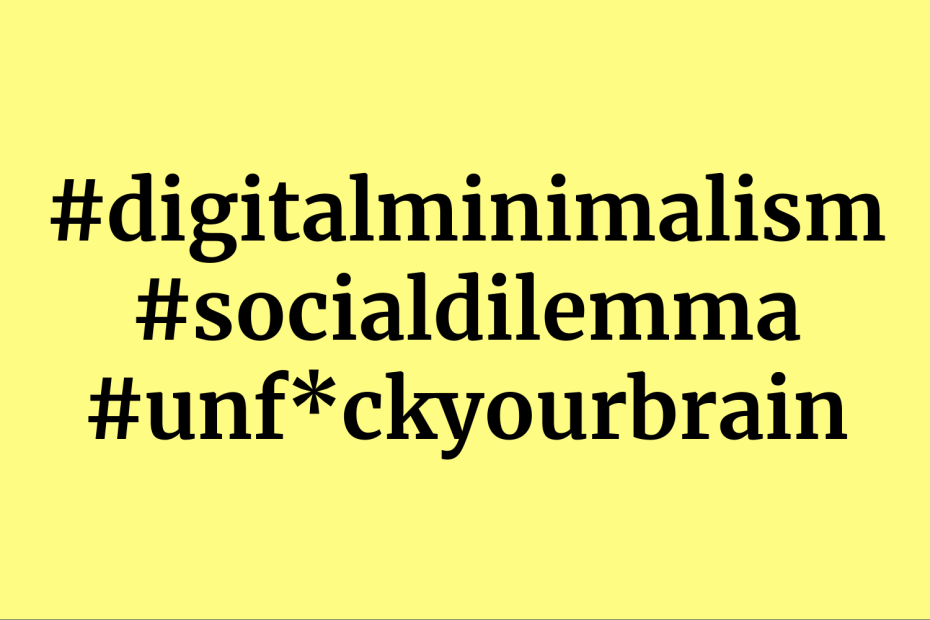A recent COS Camp talk led me to once again think about my personal usage of digital media, and the way it influences my day-to-day. Even though it was not the first time for me that I took this mental detour, I needed the reminder to once again focus on “un-fucking” my brain. To make your life easier, and also my own a little more organized, I wanted to share different insights and practices with you that I found helpful for myself.
Why our Brains Are “Fucked” in the First Place
I am a millennial, on the edge of Generation Z. Digital Media has been part of my life from an early age onwards, and to a point something that also shaped our generation. With the advance of technology, the digital domain has become increasingly fast paced, and it has become close to impossible to keep up. Increasingly, young people are making the conscious decision to withdraw from such things more and more, and therefore adopt the concept of „Digital Minimalism“.
Navigating Digital Minimalism
Digital minimalism is a philosophy that suggests that people should use technology in a more intentional, deliberate way. It involves focusing on the things that are most important to you and eliminating or reducing the use of digital tools that do not support your goals or add value to your life. This can involve things like limiting social media use, uninstalling apps that you don’t use frequently, and being more selective about the emails you read and respond to. The goal of digital minimalism is to help people live more fulfilling, meaningful lives by using technology in a way that is in line with their values and priorities.
Incorporating it into your Day-to-Day
There are several reasons why someone might want to incorporate digital minimalism into their daily life. Some people find that they are spending too much time on their devices and not enough time on the things that are most important to them, such as relationships, hobbies, or personal growth. Others may feel overwhelmed by the amount of information and distractions that are available online, and want to simplify their digital lives in order to reduce stress and increase productivity. Still others may be concerned about the potential negative effects of excessive technology use on their mental health, and want to find a healthier balance. Ultimately, the decision to adopt digital minimalism is a personal one and will depend on your individual goals and values.
Benefits of Digital Minimalism
There are a number of potential benefits to incorporating digital minimalism into your daily life. Some people find that they are able to reduce stress and increase productivity by simplifying their digital lives. Others may find that they have more time and energy to pursue the things that are most important to them, such as relationships, hobbies, or personal growth. Digital minimalism may also help you to feel more present and focused, as you are not constantly being pulled in different directions by notifications and alerts. Additionally, some research suggests that excessive technology use can have negative effects on mental health, such as increasing the risk of anxiety and depression. By adopting a more intentional, deliberate approach to technology use, you may be able to mitigate these risks and improve your overall well-being.
„FOMO“ due to Digital Minimalism
As with any philosophy or approach to life, there are potential perceived risks or disadvantages to digital minimalism. One potential risk is that you may miss out on valuable information or opportunities if you are too selective about the digital tools you use or the information you consume. It is important to find a balance that works for you and ensures that you are able to stay informed and connected while still maintaining a sense of control over your digital life. Another potential disadvantage is that you may need to put more effort into maintaining relationships or staying in touch with others if you are not relying as heavily on digital communication tools. This can be especially challenging if the people you want to stay connected with are not located nearby or are not able to meet in person regularly. Finally, you may find that you need to be more proactive about seeking out information or resources if you are not using as many digital tools, as these tools can often make it easier to discover new things or stay up to date with the latest developments.
Coping Mechanisms that I Found Helpful
Personally, I have tried many things to slow down and unwind my brain. The following few have worked best for me:
- Restricted Phone Times
- Un-install Social Media Apps
- Take Time for Yourself
- Plan Offline Activities
- Get a Physical Alarm Clock
What about you? Have you engaged in any activities in the past, and were there any learnings you got from that? I’d be happy for you to share it in the comments!
Media Recommendations
If this article sparked your interest, I have three recommendations for further information for you:
Digital Minimalism: Choosing a Focused Life in a Noisy World by Cal Newport
a blog post by fellow COS Student Andrea Mitteregger
